






 |
||||
 |
 |
 |
 |
 |
 |
||||
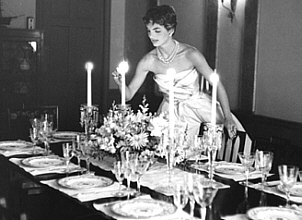 Camelot at Dawn
Camelot at DawnExcerpted from Camelot at Dawn: Jacqueline and John Kennedy in Georgetown, May 1954. (Johns Hopkins University Press, 2001). Photographs by Orlando Suero. Text by Anne Garside, director of public information at the Peabody Institute.
Suero shot over 1,000 negatives, many of which never found their way into the public eye. When Lowenherz sold his picture agency in 1983, he retained ownership of the collection, and six years later gave all the photographs to Hopkins's Peabody Institute for safekeeping. They remain, today, in the Peabody Archives.
Lowenherz, a German-Jewish immigrant, asked that the
following statement should accompany his gift: Let this
visual record of a great American family be my tribute of
gratitude to America, which gave me so much.
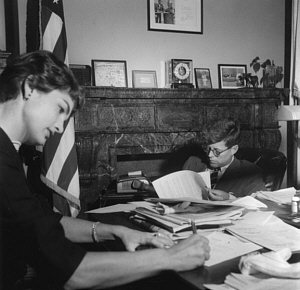
At this period in their marriage, Jackie often worked with
Jack in his office--Room 362 in the Old Senate Office
Building, directly across the hall from Vice President
Richard Nixon. She helped him select what she thought he
should read and drafted replies to letters from
constituents. "This was a real working session in his
office," says Suero of the Thursday morning shoot on May 6.
"It wasn't set up for the camera. Jackie was helping him
read and edit materials."
In later years, as JFK grew more conscious of his image, he
refused to be photographed with glasses.
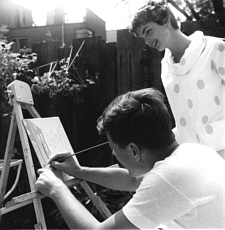 While making the effort to share Jack's political interests,
Jackie also hoped to draw him into her own artistic
pursuits. At their first Christmas together with the Kennedy
family, she gave him a very expensive set of oil paints.
Over several weekends in April and May, the painting set
came back out. With Jackie's encouragement, Jack set about
his new hobby with characteristic intensity--if minimal
artistic skill. Jack was so pleased with his Dent Place
paintings that he gave one or two of them as presents to
Bobby and Ethel and other family members. Two of his works
later accompanied him to the White House.
While making the effort to share Jack's political interests,
Jackie also hoped to draw him into her own artistic
pursuits. At their first Christmas together with the Kennedy
family, she gave him a very expensive set of oil paints.
Over several weekends in April and May, the painting set
came back out. With Jackie's encouragement, Jack set about
his new hobby with characteristic intensity--if minimal
artistic skill. Jack was so pleased with his Dent Place
paintings that he gave one or two of them as presents to
Bobby and Ethel and other family members. Two of his works
later accompanied him to the White House.
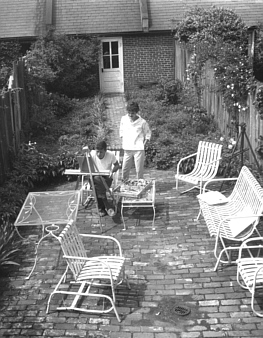
On Saturday afternoon, Jack and Jackie teamed up with Bobby
and Ethel at a nearby park. Jack was sometimes held to have
"majored in football" at Harvard. In spite of his slight
build and puny weight, he went all out to win a place on his
college's second football squad. All his life, football
stars were among the people he admired most.
Perhaps JFK's most courageous attribute was his
determination to ignore the almost constant pain he suffered
with his chronic back condition. "I had no idea that Jack
was in agony with his back," said Suero. "It never showed in
anything he did." 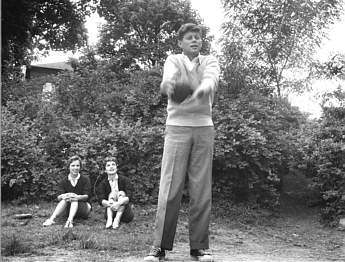
Due to worsening health problems, Jack's weight in the first
year of his marriage plummeted from 175 pounds to 140
pounds. He tried to make a joke of it, telling his sister
Eunice: "Don't worry. It's nothing serious. Just a result of
Jackie's cooking."
Housekeeping was casual at the O Street home of Bobby and
Ethel Kennedy, pictured here with their first three
children. "No doors were ever shut and everybody wandered
through every room all the time," related one family
friend.
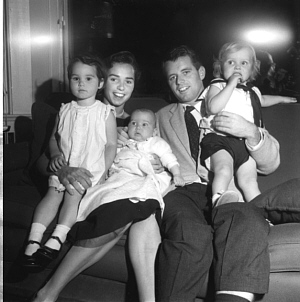
Bobby and Ethel's first two children were named in memory of
Bobby's sister Kathleen and brother Joe, both of whom died
tragically. Not until January 17, 1954, when Robert Francis
Kennedy Jr. was born, did Bobby have a namesake. In this
photo, Kathleen [far left], soon to celebrate a third
birthday, takes in everything around her with an intent,
wide-eyed gaze; currently Kathleen Kennedy Townsend serves
as lieutenant governor of Maryland.
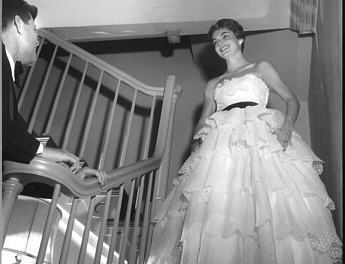
On Saturday evening, May 8, Senator and Mrs. Kennedy
attended a dinner at the home of newspaper columnist Joe
Alsop, then went on to a small dance. Suero provides a
joyous image of Jackie floating down the narrow staircase of
the house at Dent Place in a crinoline gown, a perfect dress
for dancing, while Jack gazes up at her in rapt attention.
It was admiration tempered by his usual deprecating humor.
"Jack said something like 'Jackie, you look absolutely
gorgeous,'" Suero relates, "but he was always kidding her,
so he followed up this compliment with 'but if you stood
sideways, you'd disappoint half the men in America!'"

Jack and Jackie much preferred having a few close friends in
for dinner to going out to official Washington parties. At
this informal party, which included Robert and Ethel
Kennedy, Bobby brought his German shepherd puppy along.
House guest Lem Billings (the tall man in the white suit)
also had his big poodle with him, so Jackie had four guests
and two dogs for dinner that night. After dinner, Jack
smoked a Cuban cigar, a taste he had acquired since his
wedding. Jackie encouraged it so that he could not complain
about her smoking. Later, as president, he had to renounce
Cuban cigars when the United States imposed a blockade on
Cuba.
|
 |
|
 The Johns Hopkins Magazine | The Johns Hopkins University |
3003 North Charles Street |
The Johns Hopkins Magazine | The Johns Hopkins University |
3003 North Charles Street | Suite 100 | Baltimore, Maryland 21218 | Phone 410.516.7645 | Fax 410.516.5251 |
|